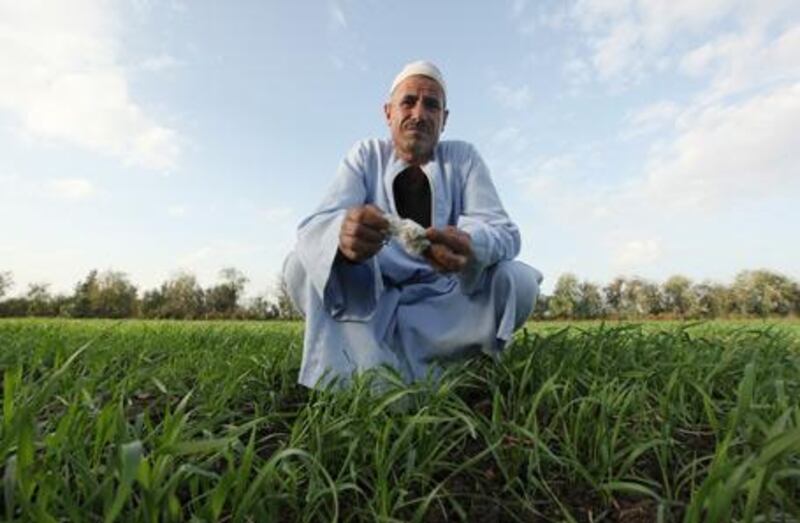BAHEIRA, Egypt // When Gamal Abdel Nasser, one of modern Egypt's first presidents, made his famous decision to redistribute Egypt's farmland in 1952, cotton was still the reigning king of crops. That was when Mahmood Hassan Mekawy, 44, whose father was given three feddans from the estate of a wealthy Turkish landowner, could build a decent life by growing the "white gold".
Back then, government-run companies purchased the land's fluffy bounty at a generously subsidised rate. "Before, cotton was the crop to make money," said Mr Mekawy's son, Mahmoud Mohammed Mahmoud Mekawy, 23. "If someone wanted his daughters or sons to get married, he would grow cotton. If he wanted to build a house, he would grow cotton. It's not like that anymore." After 57 years of good harvests, 2009 was the first year that the Mekawy farm did not grow any cotton.
That decision came after nearly two decades of watching cotton prices plummet. But it was the past three years that hit the Mekawy family farm the hardest. In 2006, cotton was still being sold for about 1,200 Egyptian pounds (Dh800) per qantar, said Mr Mekawy. The following year, the price dropped to around 800 to 820 pounds for every qantar he would grow. Finally, cotton's coup de grace came in 2008, when Mr Mekawy was forced to sell the "white gold" for a punishing 600 pounds per qantar.
"Last year, the cotton was stacking up. No one would buy. We were asking around for people to buy it," said the senior Mr Mekawy. "None of the traders wanted to buy it, so we had to sell it for 600 pounds." At those prices, Mr Mekawy's farm could not even break even. Cotton can be a big earner, but it demands considerable overhead. To reap the crop, Mr Mekawy used to hire about 50 workers for each feddan, each of whom demanded 30 pounds per day. And since the government removed subsidies on fertiliser 10 years ago, the price has risen to 100 pounds per sack from 30 pounds.
Those past three seasons left Mr Mekawy with 15,000 pounds of debt. To make up for the loss, he sold his four milk cows. Now, he only has his fields, which he uses to grow rice and corn during the summer and wheat, beans and hay in the winter. When told that the Egyptian government has renewed its subsidies for cotton processing plants in the past several years, Mr Mekawy was unimpressed. Egypt's cotton mills are continuing to purchase cheap Asian imports, he said, driving down the price and prompting farmers here to all but abandon cotton.
"I want the government to take the cotton at a higher price so that we can grow more," he said. "If we're getting cotton from countries abroad, we're benefiting them. But what about us?" But if misery does indeed love company, there may be some cold comfort in the entire town's declining fortunes. Of the 192 feddans in the Mekawy's small village, he estimated that only about 10 farmers continue to grow the crop on about a seven or eight feddans of land, a harvest that is "barely enough for a few mattresses", he said.
But thanks to such a high rate of attrition, the price jumped this year to a middling 800 pounds per qantar, said Mr Mekawy. And cotton's woes have spread beyond the fields. The local cotton processing plant - a significant employer for this dusty hamlet of palm trees, tiny fields and clogged irrigation ditches - recently shut down, putting even more men out of work. "I'm bored. Everything has stopped. There is nothing," said Mr Mekawy. "I just don't know how to make things work."
The lack of opportunity has dashed hopes for men such as younger Mr Mekawy, who now works at a local water company instead of tending his father's fields. He dreams of a lucrative job at a petroleum company, but thoughts of returning to the fields remain far from his mind. "Without cotton, [the land] won't be worth anything. The farmers here will be broke," he said. But the younger Mr Mekawy has not yet decided whether to eventually sell his family's land - those three feddans that the government gave to them during a time when helping Egypt's farmers was still a top priority.
"Maybe one day it will be built on. Maybe then it will be worth it to sell," he said. "But as far as Egyptians are concerned, if you don't have land, you don't have honour." @Email:mbradley@thenational.ae





